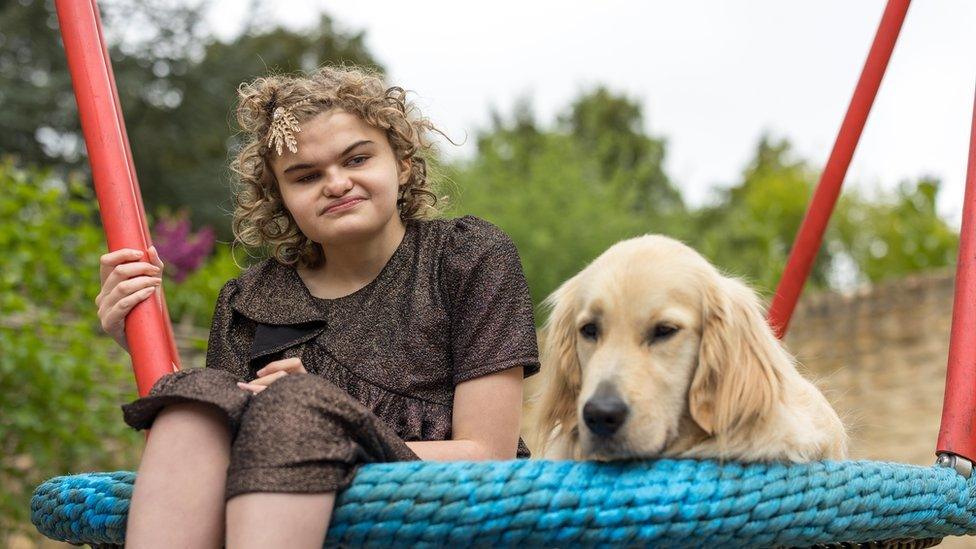Wiltshire mum's energy debt for daughter's life-support machine
- Published

Josselin has a rare genetic condition called CHARGE syndrome, unable to walk, talk, see or hear she relies on 24hr care, pictured here with guide dog Stormzy at Julia's House
A Wiltshire mum says powering the life-support system for her 16-year-old daughter is pushing her into debt, due to the rise in energy costs.
Josselin Tilley has been blind and deaf from birth and needs a ventilator during the night, due to a rare genetic condition called Charge syndrome.
Her mother Karen says she is now struggling to pay electricity bills.
The Department for Work and Pensions say it is taking decisive action to protect the most vulnerable.
Josselin needs 24-hour care from her family, with support from children's hospice Julia's House, due to the life-limiting condition. She is also unable to walk, talk, and is tube fed.
After monthly rises, Mrs Tilley told BBC Radio Wiltshire she was forced to cancel her direct debit when her energy bill reached £427 per month.
"I now try to pay around £250 a month but with us not being on direct debit I'm charged a higher tariff. I know we're going to go into arrears."

Mum Karen, with 16-year-old Josselin, younger brother Dalton and Stormzy the buddy dog
The life-support equipment at home for Josselin has increased Mrs Tilley energy costs significantly.
And with energy bills due to rise again in April 2023, Mrs Tilley is worried for the future of her family.
She said: "There needs to be more consideration for families using ventilators, oxygen condensers, suction machines, a hoist and a stair lift and I do think we get forgotten about."
Following the announcements made by the chancellor in the Autumn budget, James Taylor, director of strategy at disability equality charity Scope, said: "This package delivers short-term financial relief for many disabled people in this country. That money is needed is now.
"Inflation and energy prices are still running riot and average prices will hit £3,000. Disabled people often have higher than average usage and £150 won't go far enough.
"We have seen an increase of 670% in referrals to our Disability Energy Support service from disabled people in desperate need. Imagine having to choose between staying warm, feeding your family, or powering essential medical equipment.
"The government must do the right thing and look at a social energy tariff to support disabled people at this time of greatest need."
No 'consideration'
Mrs Tilley was supported by her husband, until he caught Covid-19 in 2020 and his health deteriorated rapidly.
He was in a coma for four weeks, suffered a stroke and had to learn to walk and talk again.
While he is now stable and recovering, it has left him too weak to look after Josselin or to work and he also needs help from a ventilator during the night.
Mrs Tilley welcomes the £150 one-off payment announced in the Autumn budget but says not all people with disabilities have above average energy bills, compared to her family who has to power essential medical equipment every day.
She added: "I don't feel they've (the government) given any consideration to families like ours who have medical equipment and machines to keep (our daughter) alive."
A Department for Work and Pensions spokesman said: "We know disabled people face additional costs and this government is taking decisive action to protect the most vulnerable.
"Disability benefits will be increased in line with inflation for 2023-24 the Energy Price Guarantee will save the typical household over £900 this winter based on expected energy prices.
"In addition, to those already made, we are making £900 of new Cost of Living payments to those on means-tested benefits and a further £150 Disability Cost of Living payment to individuals on disability benefits in 2023/24."

Follow BBC West on Facebook, external, Twitter, external and Instagram, external. Send your story ideas to: bristol@bbc.co.uk , external